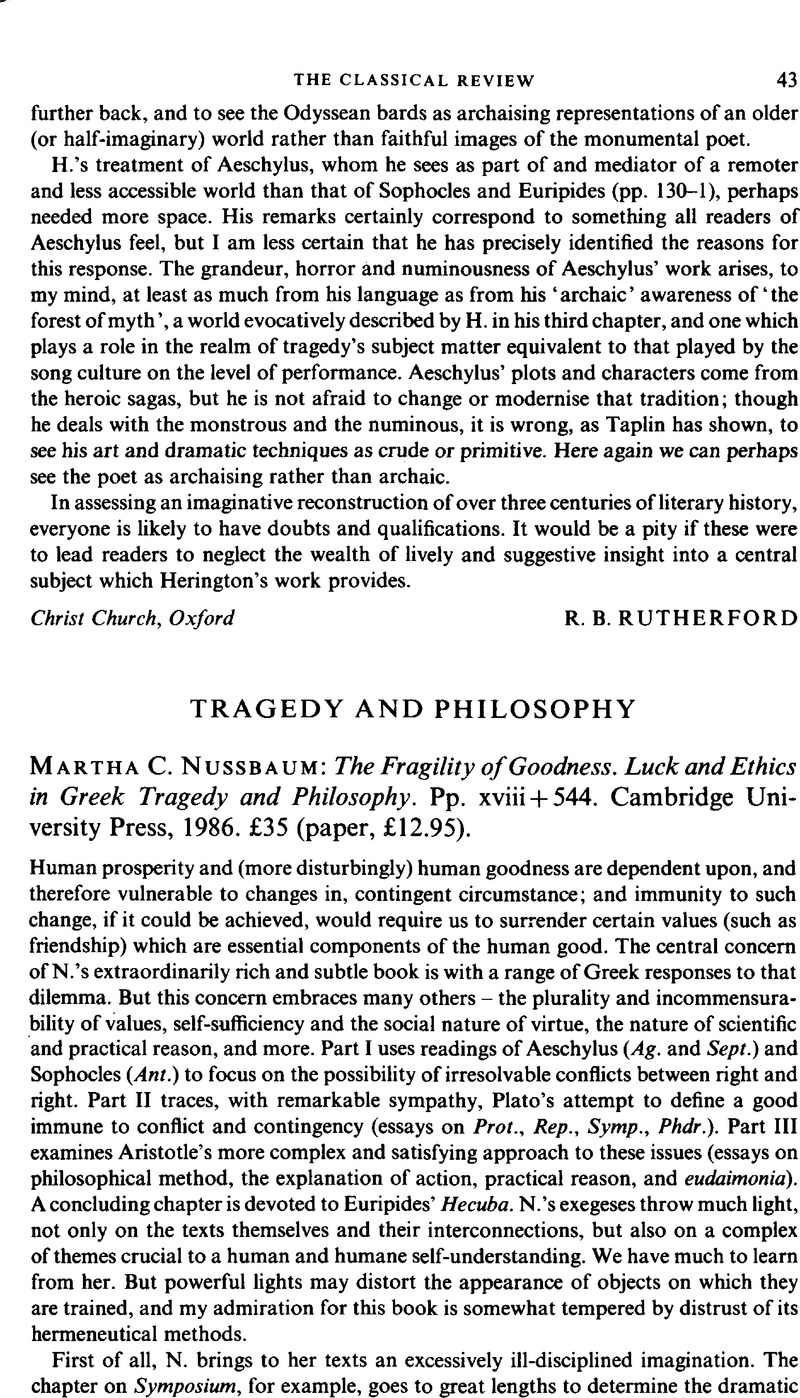No CrossRef data available.
Article contents
Tragedy and Philosophy - Martha C. Nussbaum: The Fragility of Goodness. Luck and Ethics in Greek Tragedy and Philosophy. Pp. xviii + 544. Cambridge University Press, 1986. £35 (paper, £12.95).
Published online by Cambridge University Press: 16 February 2009
Abstract

- Type
- Reviews
- Information
- Copyright
- Copyright © The Classical Association 1987
References
1 P. 510 n. 45 does not convincingly meet this point; indeed, the lack of explicit consultation could be taken to show the unconditional nature of Hecuba's trust in her companions.
2 I do not want to suggest that Hecuba's action is morally or emotionally unproblematic (886–7 preclude that); Meridor, (AJP 99 [1978], 28–35Google Scholar, not cited by N.) oversimplifies. But N., too, is committed to an oversimplification by her mistaken (though Aristotelian) belief that deserved suffering cannot excite pity (p. 384).
3 See, e.g., Reiske, in Nova Acta Eruditorum for 1748, pp. 533–551.Google Scholar
4 The discussion of various other aspects of Poetics (pp. 378–94) is, however, excellent; it contains the richest and most attractive formulation of the theory of katharsis as clarification that I have seen. One gross error: p. 386, on history and poetry, confuses the distinction between particular and universal with that between idiosyncratic and general (it is hardly true, in any case, that the principals of tragedy are more ordinary than those of history: contrast N. herself, p. 129).
5 Proclus In Tim. 183.19–25; [Hermogenes] Meth. 455.1–5 Rabe. (I note in passing N.'s strange belief that a dialogue's ‘dry and abstract tone positively discourages the arousal of emotions and feelings’ [p. 131]; as if the readers of– say – Gorgias were not invited by numerous dramatic and rhetorical devices to think Socrates nicer than Callicles.)
6 The way in which N. uses ‘serious’ on pp. 12, 128, suggests that any other end would be frivolous. It is striking how thoroughly she suppresses her sense of humour in this book (compare YCS 26 [1980], 43–98Google Scholar, which treats Aristophanic jokes as if they were contributions to Mind); she is familiar – one presumes – with friendly banter, but one would not guess it from her comments on the opening of Protagoras (p. 92: ‘how, we wonder, is it obvious’ that Socrates has come from pursuing Alcibiades). This is very un-Aristotelian (p. 261).
7 Although I would argue that the external goods needed, according to Aristotle, ‘in addition’ (προσδεῖται, EN 1100b8) should be understood as constituents of eudaimonia, not simply as instrumental (so N., ch. 11); surely Aristotle did not believe that nobody εὐδαιμον⋯ζει Priam (1100a 10) solely because his misfortunes prevented him being so generous and so forth? (N. herself argues that, for Aristotle, philia, ‘the greatest of external goods’ [1169blO], is intrinsically as well as instrumentally valuable: pp. 362–8). N.'s translation of eu εὐ πρ⋯ττειν as ‘act well’ is highly misleading.




